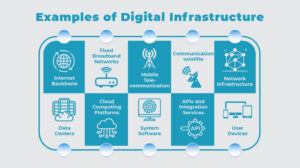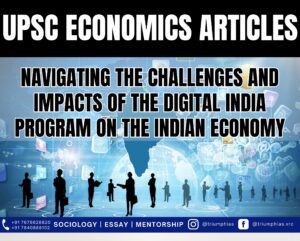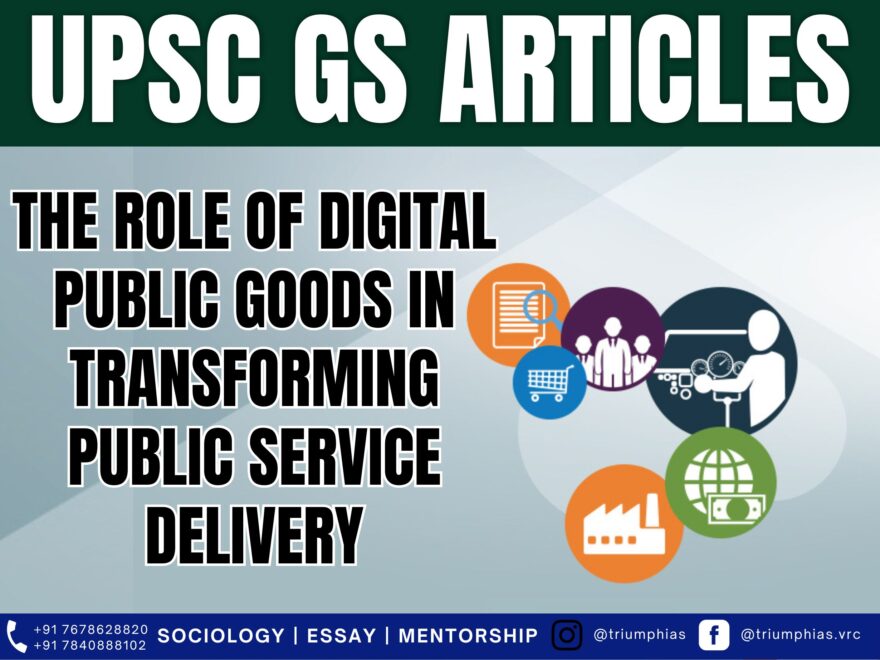Digital infrastructure:
Efficiency in public service delivery
(Relevant for General Studies Paper Prelims/Mains)

Digital infrastructure:
Efficiency in public service delivery
The concept of Digital Public Infrastructure (DPI) and Digital Public Goods (DPG) is gaining traction as a means to accelerate a nation’s inclusive economic development, as demonstrated by India’s focus on DPIs within the G20 context. The establishment of DPIs can occur primarily through two methods: either through DPGs or through proprietary solutions.
Government utilization of digital technologies has predominantly relied on solutions provided by the private sector. This approach offers numerous benefits, including access to solutions from reputable brands, immediate cost savings, and the option to outsource development and maintenance. These advantages facilitate rapid problem-solving and yield quick returns.
Digital Public Goods (DPGs)
Digital Public Goods (DPGs) refer to digital resources and software that are made available for public use, typically with the aim of benefiting a wide range of users and promoting public good.These resources are often open-source and can include various types of digital assets, such as software, data, content, and standards
DPGs can be used to deliver new and enhanced public services, such as:
- Identity systems
- Healthcare
- Government schemes
- Digital public infrastructure, such as banking and payments
Some examples of DPGs in India include:
Digital Public Goods as an Alternative Method of Public Service Delivery
- Vendor Lock-In: Vendor lock-in arises when an organization heavily relies on products or services from a specific technology provider, limiting flexibility and hindering the adoption of alternative solutions. A study conducted by PwC identified vendor lock-in as a primary obstacle to achieving interoperability among diverse public service delivery systems.
For instance, during its initial service phase, Apple constrained users to utilize iTunes exclusively. Music purchased through iTunes could only be played within the iTunes application or on an iPod.
- External Dependency: Depending on external entities, whether foreign technology corporations or international organizations, can expose an organization to vulnerabilities.
- Lack of Adaptability: Digitization initiatives must possess the ability to adapt to evolving needs and circumstances. For example, during the Covid-19 pandemic, many public institutions struggled to shift quickly to online service delivery due to the inflexibility of their existing systems.
- Risks of Discontinuation or Unilateral Modifications: When external entities control digital systems, there is a risk of these entities discontinuing services or making unilateral alterations that may not align with the interests of the local government or organization.
For instance, in 2014, the Government launched the National Digital Literacy Mission (NDLM) in partnership with the private sector. However, in 2017, the private sector partner, Tata Consultancy Services (TCS), opted to withdraw from the project. This decision created a significant gap in NDLM implementation and adversely impacted its sustainability.
- Interoperability: Interoperability is vital for seamless data exchange and collaboration among different systems. Siloed systems lacking interoperability can result in duplicated efforts and data fragmentation.
For instance, the government’s Aadhaar biometric identity program is not integrated with the government’s tax system.
- Duplication and Fragmentation: Effort duplication and system fragmentation can lead to inefficiencies and increased costs. Coordination and collaboration among different organizations involved in digitization endeavours are imperative to mitigate these issues.
For example, the government administers multiple programs aimed at providing healthcare and education to underprivileged populations.
- Public Service Delivery Costs: Ultimately, digitization efforts in public service delivery aim to enhance efficiency and reduce costs. However, when the aforementioned challenges are not adequately addressed, digitization initiatives can result in heightened expenditures.
As an illustration, the government allocates a substantial budget for subsidies, yet many of these subsidies do not reach their intended recipients.
Challenges for Digital Public Goods
- Financing and sustainability: Digital public goods (DPGs) frequently encounter challenges in securing sufficient and consistent funding for their development, maintenance, and expansion. Additionally, they must establish viable business models to ensure their long-term viability and effectiveness.
- Technical capability and interoperability: DPGs necessitate a high level of technical expertise and capacity for their design, implementation, and management. Furthermore, they must adhere to open standards and protocols that facilitate compatibility with other systems and platforms.
- Digital divide and inclusion: DPGs must address the digital divide that exists among countries, regions, and communities, as well as within them. They must guarantee that their solutions are accessible, affordable, pertinent, and user-friendly for all potential beneficiaries, particularly the most vulnerable and marginalized groups.
- Data and digital rights: DPGs must uphold and safeguard the data and digital rights of their users, including privacy, security, consent, ownership, and governance. They must comply with relevant laws and regulations, in addition to adhering to ethical principles and best practices
Ways to better use DPGs
- Introducing DPGs (Digital Public Goods) and Infrastructure: As part of a comprehensive digital transformation strategy, governments have the opportunity to introduce Digital Public Goods (DPGs) and digital infrastructure to align the visions and objectives of various stakeholders. This may encompass the creation and implementation of open-source solutions that foster collaboration, efficiency, and coordination among diverse government agencies and departments.
- Developing Open-Source Policies: Governments can establish open-source policies to reduce reliance on proprietary solutions, promote innovation, and enhance transparency. These policies can incentivize the acquisition and utilization of open-source technologies in government initiatives. Embracing open-source technology can provide governments with access to a broader developer community, cost-effective solutions, and increased flexibility for tailoring digital tools to meet specific requirements.
- Reforming the Tendering System: The tendering system plays a pivotal role in selecting and executing digital projects. It is essential to reform this system to better recognize the needs and capabilities of systems integrators as partners. This reform can facilitate the customization and integration of Digital Public Goods with existing systems, ensuring their sustainability and scalability. It also encourages collaboration between governments and technology providers.
- Utilizing Existing Digital Infrastructure: Governments should explore opportunities to leverage successful existing digital public infrastructure when embarking on new projects. For instance, India’s CoWIN platform, which supported its Covid-19 vaccination campaign, built upon previous digital initiatives like e-Vin and India Stack. By building upon proven systems, governments can save time, resources, and effort while efficiently addressing large-scale challenges.
- Establishing an International Leadership Coalition: Collaborative efforts on a global scale are essential for advancing digital public goods. Governments can take the lead in establishing an international leadership coalition that includes heads of state, high-level executives from the private sector, and other stakeholders. This coalition can facilitate the exchange of best practices, mobilize resources, and create synergies to accelerate the development and adoption of impactful digital solutions in developing countries.
While the government bears the responsibility of delivering public services, ensuring sustainable development demands a collaborative effort that brings together the private and public sector. This collaboration is essential for the successful implementation of DPGs at a massive scale, reaching millions of individuals. This is precisely where the private sector can play a crucial role in supporting and driving user-centric innovation, thereby encouraging a broader adoption of digital solutions.
Reference The Hindu
Related Blogs…
 |
 |
Frequently Asked Questions:
Q1: What is the significance of Digital Public Goods (DPGs) in public service delivery?
Answer: DPGs, often open-source in nature, serve as resources that enhance the efficiency, accessibility, and cost-effectiveness of public services, thereby playing a crucial role in the inclusive economic development of a nation.
Q2: How do issues of vendor lock-in affect the adaptability of digital systems in public services?
Answer: Vendor lock-in restricts the flexibility of public service systems, making them less adaptable to changing needs and potentially hindering interoperability with other platforms.
Q3: What challenges do Digital Public Goods face in terms of data and digital rights?
Answer: DPGs must navigate complexities related to data privacy, security, consent, and governance, while adhering to legal and ethical standards to protect user rights.
Q4: How can public-private collaboration enhance the scalability of Digital Public Goods?
Answer: Public-private collaboration can bring in the technical expertise, innovation, and financial resources needed to scale DPGs, thereby reaching a larger population more effectively.
Q5: What role does interoperability play in the success of Digital Public Goods?
Answer: Interoperability allows seamless data exchange and collaboration among various digital systems, reducing duplication of effort and enhancing the efficiency of public service delivery.
GS Related Practices Questions…
To master these intricacies and fare well in the Sociology Optional Syllabus, aspiring sociologists might benefit from guidance by the Best Sociology Optional Teacher and participation in the Best Sociology Optional Coaching. These avenues provide comprehensive assistance, ensuring a solid understanding of sociology’s diverse methodologies and techniques.
Digital Public Goods, Digital Public Infrastructure, public service delivery, open-source technology, interoperability, digital divide, digital rights, data privacy, tendering system, public-private collaboration, India’s digital initiatives, Aadhaar, UPI, NDLM

Why Vikash Ranjan’s Classes for Sociology?
Proper guidance and assistance are required to learn the skill of interlinking current happenings with the conventional topics. VIKASH RANJAN SIR at TRIUMPH IAS guides students according to the Recent Trends of UPSC, making him the Best Sociology Teacher for Sociology Optional UPSC.
At Triumph IAS, the Best Sociology Optional Coaching platform, we not only provide the best study material and applied classes for Sociology for IAS but also conduct regular assignments and class tests to assess candidates’ writing skills and understanding of the subject.
Choose The Best Sociology Optional Teacher for IAS Preparation?
At the beginning of the journey for Civil Services Examination preparation, many students face a pivotal decision – selecting their optional subject. Questions such as “which optional subject is the best?” and “which optional subject is the most scoring?” frequently come to mind. Choosing the right optional subject, like choosing the best sociology optional teacher, is a subjective yet vital step that requires a thoughtful decision based on facts. A misstep in this crucial decision can indeed prove disastrous.
Ever since the exam pattern was revamped in 2013, the UPSC has eliminated the need for a second optional subject. Now, candidates have to choose only one optional subject for the UPSC Mains, which has two papers of 250 marks each. One of the compelling choices for many has been the sociology optional. However, it’s strongly advised to decide on your optional subject for mains well ahead of time to get sufficient time to complete the syllabus. After all, most students score similarly in General Studies Papers; it’s the score in the optional subject & essay that contributes significantly to the final selection.
“A sound strategy does not rely solely on the popular
Opinion of toppers or famous YouTubers cum teachers.”
It requires understanding one’s ability, interest, and the relevance of the subject, not just for the exam but also for life in general. Hence, when selecting the best sociology teacher, one must consider the usefulness of sociology optional coaching in General Studies, Essay, and Personality Test.
The choice of the optional subject should be based on objective criteria, such as the nature, scope, and size of the syllabus, uniformity and stability in the question pattern, relevance of the syllabic content in daily life in society, and the availability of study material and guidance. For example, choosing the best sociology optional coaching can ensure access to top-quality study materials and experienced teachers. Always remember, the approach of the UPSC optional subject differs from your academic studies of subjects. Therefore, before settling for sociology optional, you need to analyze the syllabus, previous years’ pattern, subject requirements (be it ideal, visionary, numerical, conceptual theoretical), and your comfort level with the subject.
This decision marks a critical point in your UPSC – CSE journey, potentially determining your success in a career in IAS/Civil Services. Therefore, it’s crucial to choose wisely, whether it’s the optional subject or the best sociology optional teacher. Always base your decision on accurate facts, and never let your emotional biases guide your choices. After all, the search for the best sociology optional coaching is about finding the perfect fit for your unique academic needs and aspirations.
To master these intricacies and fare well in the Sociology Optional Syllabus, aspiring sociologists might benefit from guidance by the Best Sociology Optional Teacher and participation in the Best Sociology Optional Coaching. These avenues provide comprehensive assistance, ensuring a solid understanding of sociology’s diverse methodologies and techniques. Sociology, Social theory, Best Sociology Optional Teacher, Best Sociology Optional Coaching, Sociology Optional Syllabus.
Best Sociology Optional Teacher, Sociology Syllabus, Sociology Optional, Sociology Optional Coaching, Best Sociology Optional Coaching, Best Sociology Teacher, Sociology Course, Sociology Teacher, Sociology Foundation, Sociology Foundation Course, Sociology Optional UPSC, Sociology for IAS,
Follow us :
🔎 https://www.instagram.com/triumphias
🔎https://www.youtube.com/c/TriumphIAS
https://t.me/VikashRanjanSociology
Find More Blogs
|
Scope of the subject and comparison with other social sciences |
|||
|
|
|
|
Modernity and social changes in Europe |



2 comments